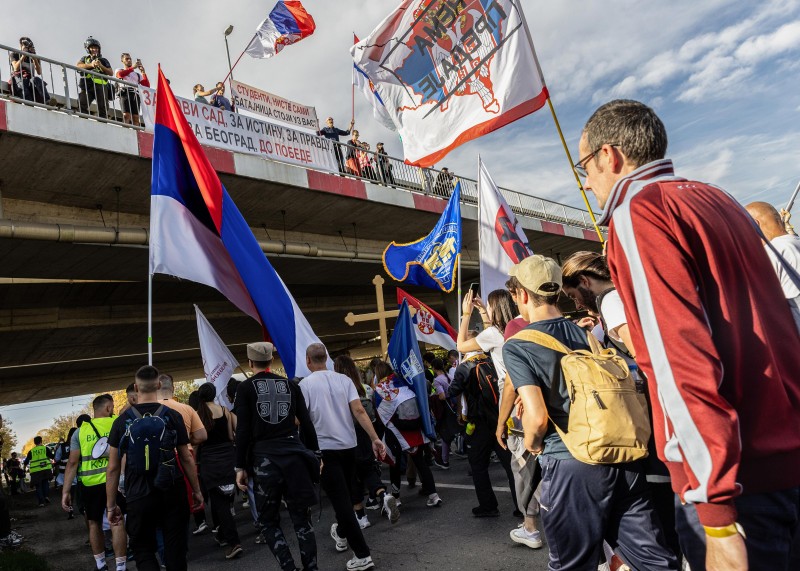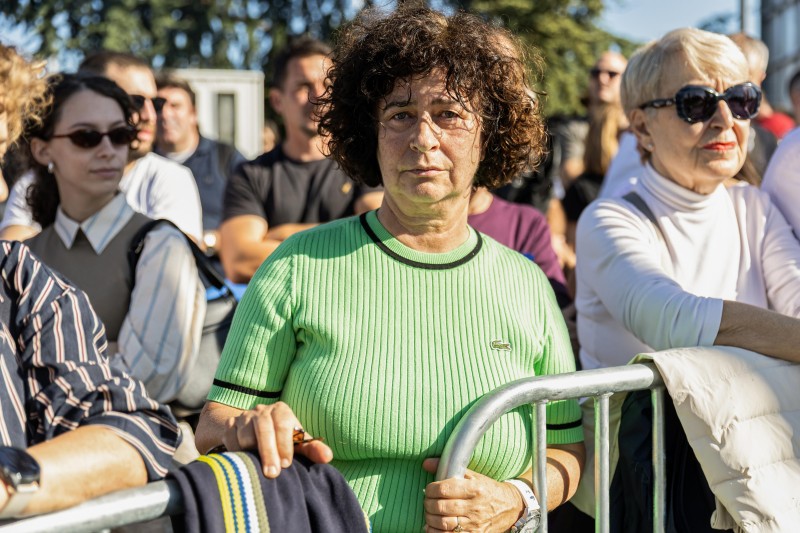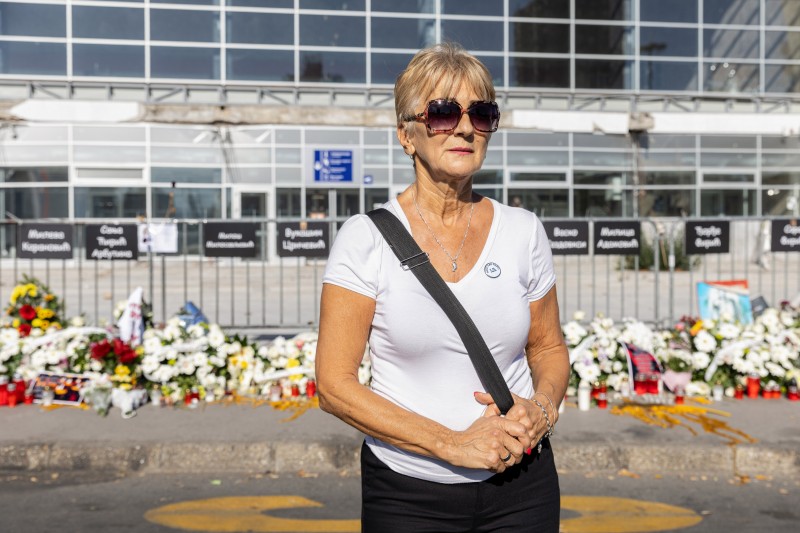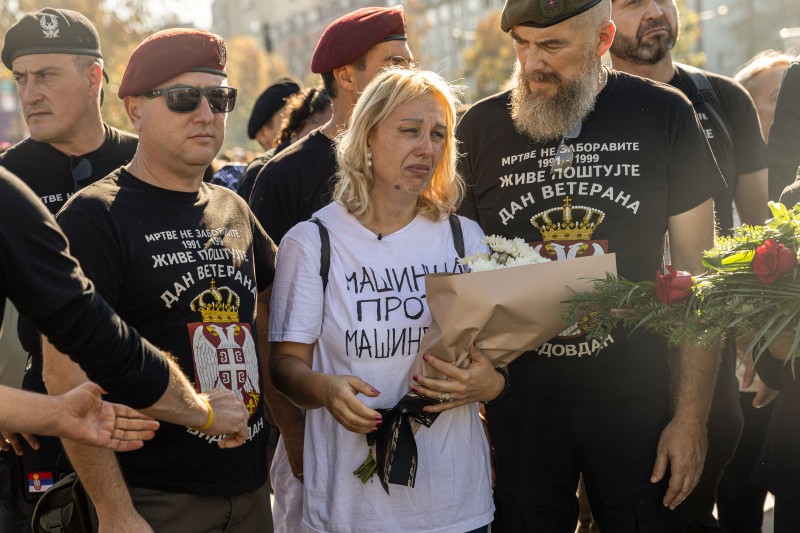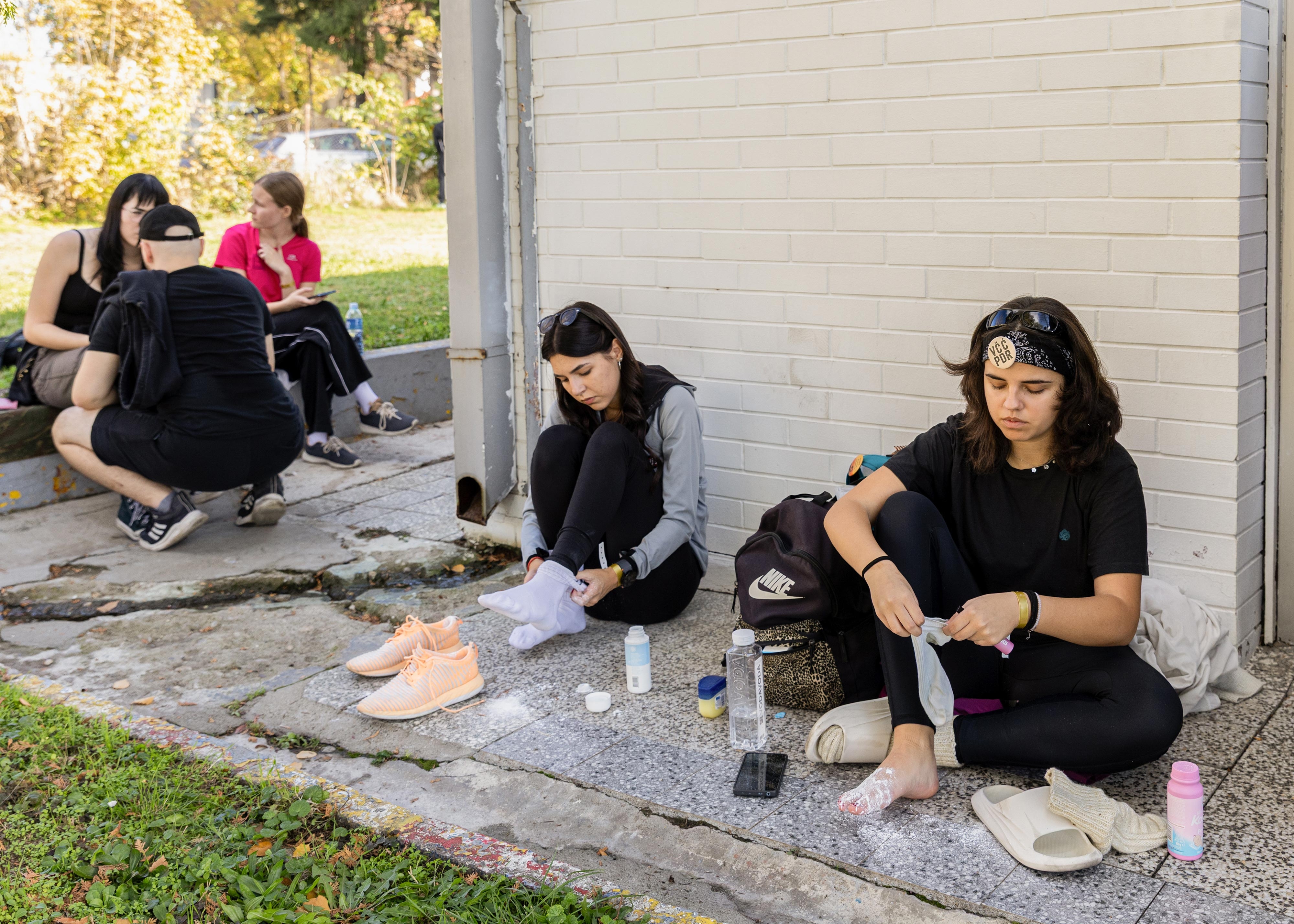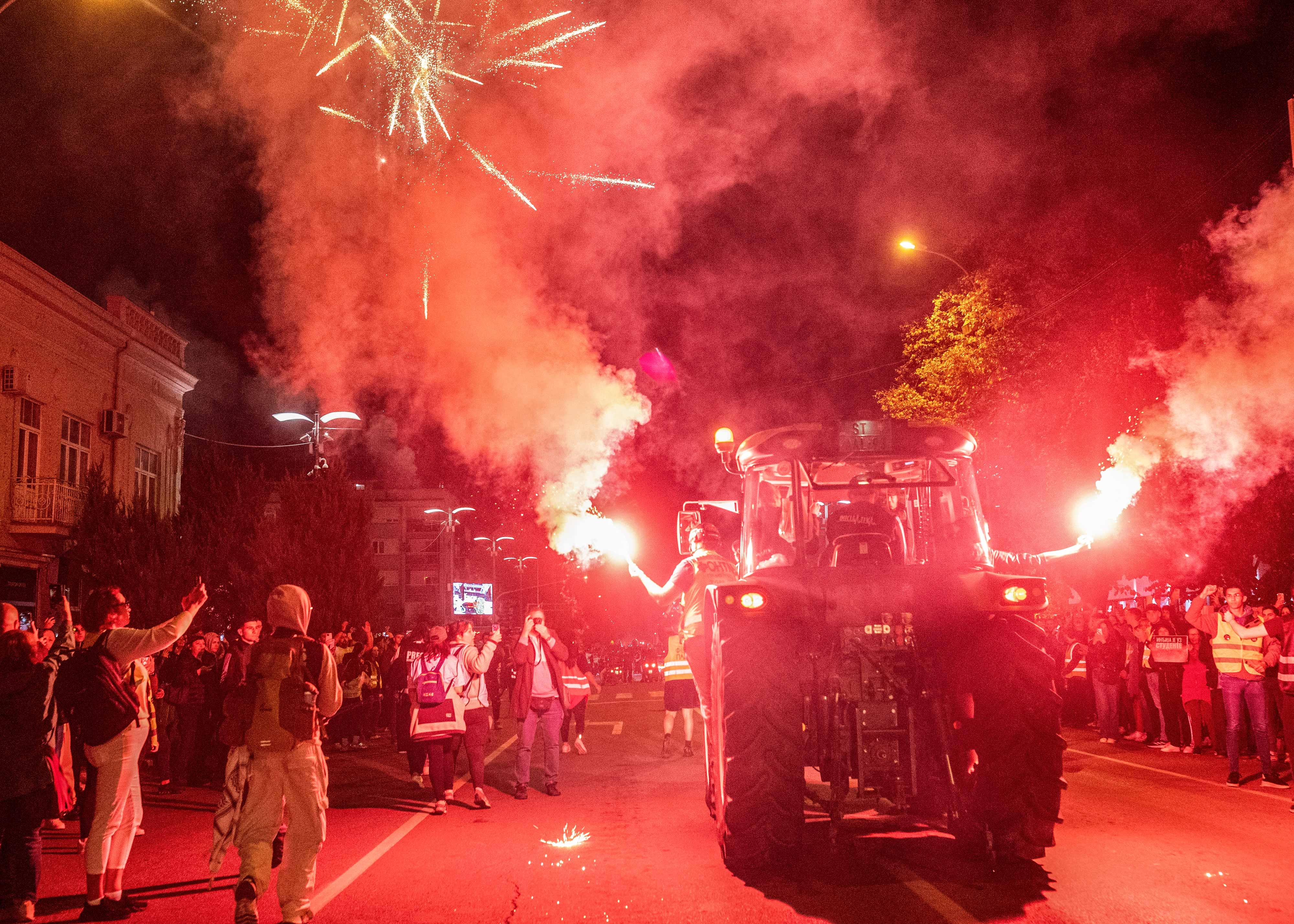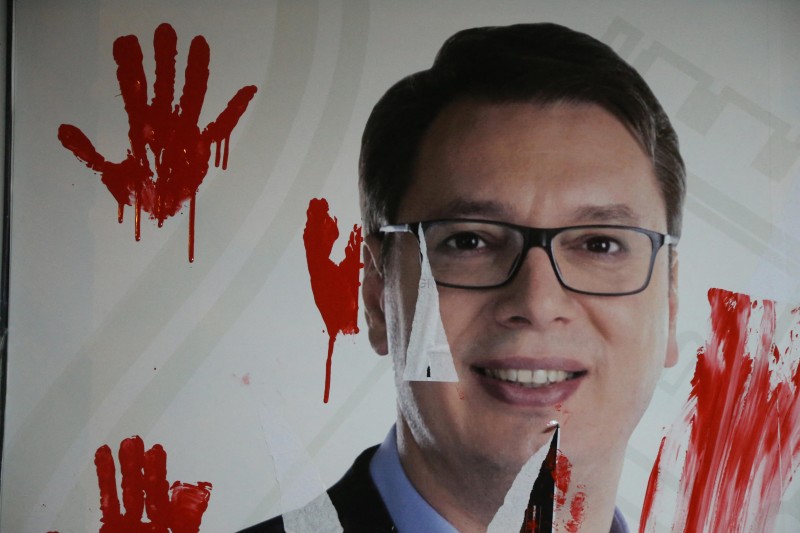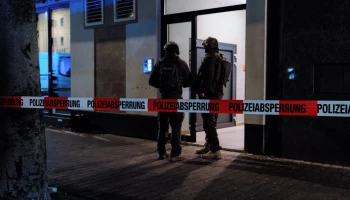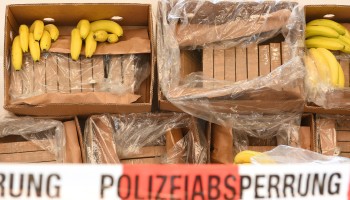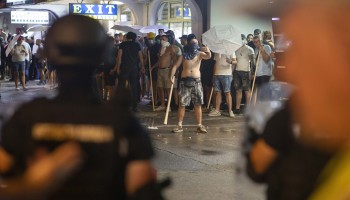After walking for days - some for more than two weeks and covering over 400 kilometers - tens of thousands of young Serbians converged on the northern city of Novi Sad on Saturday to mark the anniversary of the train station canopy collapse that killed 16 people and sparked the largest anti-corruption protests in the country’s history.
The youth have linked the collapse to graft during the recent reconstruction of the station and have spent the past year demanding accountability for the deaths.
“We hope justice will be served and those responsible will be held accountable because this is a great tragedy, the 16 lives are a huge loss and I say again: corruption is to be blamed,” said Nina Jasmina Vučković, 64, a teacher from Belgrade.
Teacher Nina Jasmina Vučković.
After a night of euphoric celebration that swept through the city as the students finally arrived, Novi Sad fell silent on the morning of November 1 - the anniversary of the day the tragedy changed Serbia.
The young marchers walked toward the train station, no longer blowing whistles or chanting slogans about never growing tired, as they had throughout the year. Instead, they carried flowers, candles, and a black banner bearing the names of the 16 victims. Tears of sadness replaced last night’s tears of joy.
Drone footage showed a sea of people standing still for 16 minutes starting at 11:52 - the precise moment the canopy collapsed. Afterwards, people laid flowers and lit candles next to the victims’ names written on red paper hearts.
Novi Sad resident Dušica Živanović, 65, knew one of the victims, Mileva Karanović, and said she has felt endless sorrow ever since.
Novi Sad resident Dušica Živanović.
“I also feel - and I’m almost afraid to admit this - that my anger is, unfortunately, even stronger than my grief, because no one is taking responsibility,” she told OCCRP and CINS. It is the inability to achieve justice, to see those responsible held accountable, that fuels her anger, she explained.
“You know what? It’s terrible to realize that I’ve discovered these negative emotions in myself - emotions I didn’t think I had,” she said.
Dijana Hrka, whose son Stefan was among the 16 victims, thanked the protesters for keeping her alive and called on President Aleksandar Vučić to organize snap elections. She announced she will start a hunger strike in front of the Belgrade City Council.
“I have to know who killed my child. Who killed 16 people? Someone has to be held accountable,” she told protesters through tears from an improvised stage.
Dijana Hrka who lost her son Stefan among the 16 victims of the railway collapse on November 1, 2024.
What began a year ago as mourning for the dead has transformed into a sweeping, student-led movement demanding that all project files from the Novi Sad railway station reconstruction be made public and that those responsible be brought to trial.
“Corruption kills,” read one of the first banners the students carried, alongside others showing red handprints and a message to authorities: “Your hands are bloody.”
The protests spread like wildfire across Serbia as students occupied universities city by city, denouncing what they see as entrenched corruption and impunity that pervade Serbia’s institutions, even though prosecutors have charged 13 people in connection with the collapse and several officials have resigned.
The government has consequently made some reconstruction documentation public, but the student movement says not all files were released and continues to protest.
Largely ignored by the national broadcaster and vilified by pro-government media as “foreign agents,” “fake students,” and “enemies of the state,” the protesters found another way to reach citizens cut off from independent news: they walked.
Serbian students march from Belgrade to Novi Sad on October 30, 2025, protesting after the November 2024 railway station canopy collapse in Novi Sad that killed 16 people.
Traveling from town to town, they gathered momentum and solidarity, embraced by ordinary people who saw in them a rare spark of hope for change. Along their routes, residents lined the roads to cheer them on, offering food, shelter, and bandages for blistered feet - small acts of kindness for a movement marching toward something far greater.
Local officials loyal to the government reportedly again refused to let the marchers stay overnight in schools or sports halls. Just like once before, the railway company announced a day before that trains would not run on the day of the, citing “bomb threats.”
But the walkers pressed on. Residents welcomed them with fireworks and applause as they entered each town, exhausted but triumphant. Supporters opened bars, gyms, and restaurants to house the travelers, while others cooked hot meals in the streets to greet their arrival.
Serbian residents welcoming the protestors with fireworks in Inđija, Serbia on October 30, 2025.
These outpourings of support have shown just how popular the movement has become - and how much it unnerves those in power. In response, authorities have resorted to arrests and harassment: over a thousand students and supporters have been detained over the past year, and in some cases police have brutally beaten protesters and sprayed them with tear gas.
Still, on Saturday, as the walkers gathered in Novi Sad, a Belgrade court confirmed the indictment filed by the Special Department for the Suppression of Corruption of the Higher Public Prosecutor’s Office against a manager of Serbian Railways Infrastructure and two members of the Technical Inspection Commission of the Novi Sad Railway Station.
Many Serbians, however, have lost confidence in the judiciary and government. Over the past year, protesters have included snap elections in their list of demands.
Even though the government declared Saturday a national day of mourning and President Aleksandar Vučić, who had previously called the students names, including “terrorists,” apologized on Friday, mistrust prevailed among many protesters. To some, Vučić’s apology came too late and even a water shortage in Novi Sad on Saturday was interpreted as another obstruction organized by the government.
“It’s no coincidence, and it makes us furious,” said Živanović. “Apologies don’t help. If the trains aren’t running and Novi Sad and its surroundings have no water, then apologies mean nothing.”
Red paint covers a poster of President Aleksandar Vučić on the ruling party’s building as thousands protest in Novi Sad after a deadly station collapse on November 1, 2024 during a protest on November 05, 2024.
Still, Serbia’s youth appears determined to continue insisting on its demands and seeking international attention. Several months ago, a group of students biked all the way to Strasbourg and ran marathons to Brussels to draw attention to their quest. They slowly became visible.
“One year ago, the Novi Sad train station collapse took 16 lives. We remember them today,” Marta Kos, the European Commissioner for Enlargement, wrote on X. “This tragedy is changing Serbia. It moved masses to stand for accountability, free expression, and inclusive democracy. These are the same values to lead Serbia into the EU.”
Back in Novi Sad, Ljiljana Arađanski Rajkov, 52, reflected on what the year-long protests had achieved.
“There is no giving up, and the sheer number of people here today and at previous protests is something we weren’t fully aware of - that we are united and in solidarity, and if there is any good in this, it’s that we’ve seen how many of us there are and that we are together,” she said.
“I expect that this perseverance has shown the world, shown Europe, that we exist. It seems to me that this is increasingly being noticed, and I expect that the Europe that sees us will respond. That is a great hope - that even here, we are not alone.”
